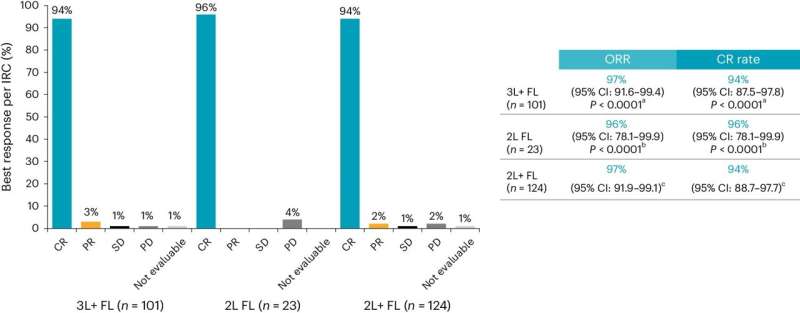This article has been reviewed according to Science X's editorial process and policies. Editors have highlighted the following attributes while ensuring the content's credibility:
fact-checked
peer-reviewed publication
trusted source
proofread
Exploring CAR T-cell therapy for aggressive follicular lymphoma

CAR T-cell therapy is an effective treatment for aggressive subtypes of follicular lymphoma, according to a clinical trial published in Nature Medicine.
Follicular lymphoma is a typically slow-growing form of non-Hodgkin lymphoma and accounts for 20% to 30% of all non-Hodgkin lymphoma cases, according to the Lymphoma Research Foundation.
While there is no cure, many people with follicular lymphoma live for decades with the disease, which is widely categorized as a chronic condition. For a subset of patients, however, follicular lymphoma can be particularly aggressive, said Reem Karmali, MD, MS, associate professor of Medicine in the Division of Hematology and Oncology, who was a co-author of the study.
Patients with aggressive follicular lymphoma often undergo multiple treatments which offer short-lived remission.
"Not every patient requires treatment," said Karmali, also a member of the Robert H. Lurie Comprehensive Cancer Center of Northwestern University. "For those that do, we expect to get a relatively durable response with that first line of treatment. However, with subsequent lines of therapy, it's expected that the remission duration shortens each time."
CAR T-cell therapy, in which a patient's own immune cells are reprogrammed to fight their cancer, has been shown to be effective in treating follicular lymphoma after other therapies have failed, but has not yet been tested as a primary treatment for those with aggressive cancer, Karmali said.
In the study, 130 relapsed follicular lymphoma patients from 31 medical centers in North America, Europe and Japan received lisocabtagene maraleucel (liso-cel), a type of CAR T-cell therapy, over the course of two years.
A total of 95 patients responded to the treatment, and 92 achieved cancer remission, according to the study. One year following the treatment, 81% of study participants were still in remission.
Roughly half of the study participants experienced side effects, the most common being inflammatory reactions to the treatment. Neurological side effects occurred in 15% of patients, according to the study.
The findings suggest CAR T-cell therapy is highly effective for treating aggressive follicular lymphoma, Karmali said.
"We're seeing response rates with CAR T that we really haven't seen before, even with frontline treatments," Karmali said. "We're now having patients go on four or five years without a recurrence of their disease, and this is typically in groups of patients where we expect disease recurrence within 12 months historically. We've had a really good track record with prior CAR T constructs, and it looks like we're seeing a similar pattern here with liso-cel."
Moving forward, Karmali and her colleagues will continue to explore CAR T-cell therapies and identify patient populations who could benefit most from the treatment.
"We are trying to identify which patient populations will benefit most from CAR T as an earlier line of therapy," Karmali said. "If we could use this earlier on patients who are not exposed to chemotherapeutics and their T-cells are therefore less dysfunctional, we might get better outcomes. There's a lot of push to look at CAR T-cell therapy as a frontline treatment for patients that have these high-risk features."
More information: Franck Morschhauser et al, Lisocabtagene maraleucel in follicular lymphoma: the phase 2 TRANSCEND FL study, Nature Medicine (2024). DOI: 10.1038/s41591-024-02986-9


















